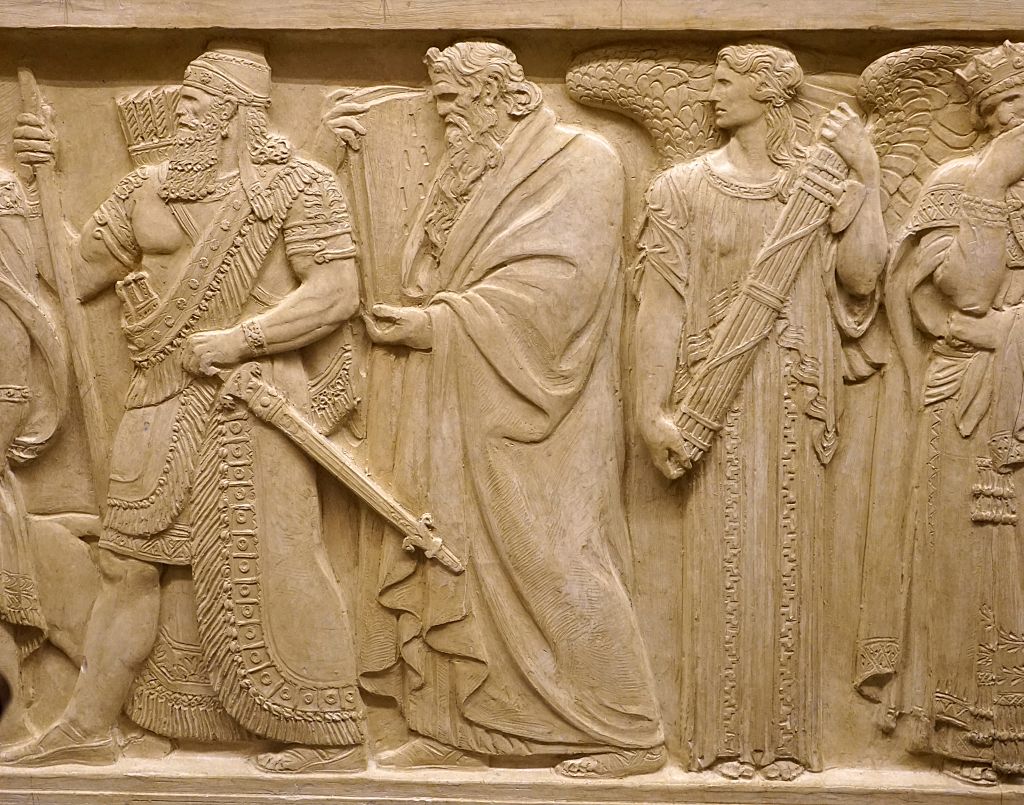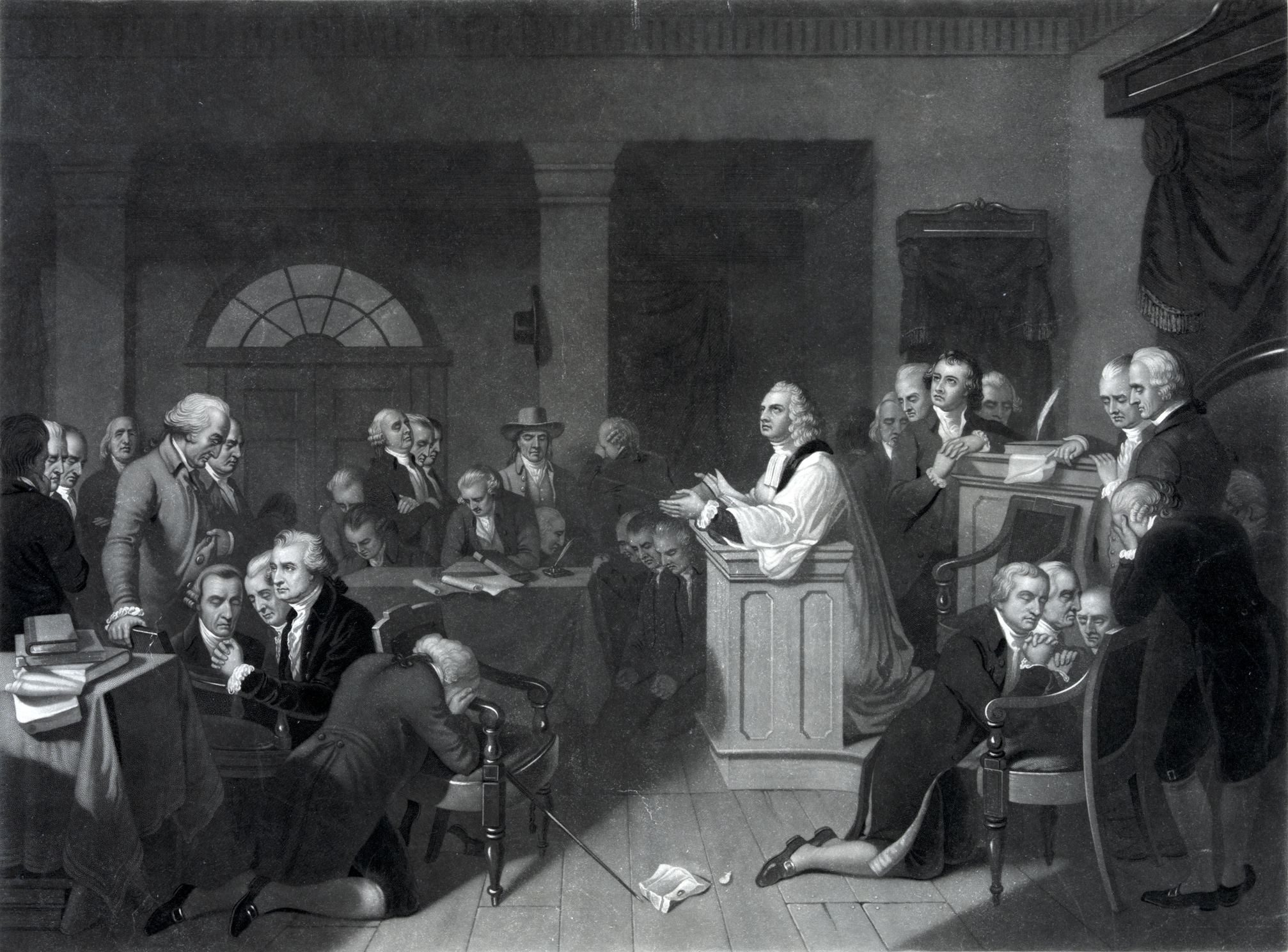Christians need to find the will to act.
Christian Nationalism in a Managerial Nation

Preserving a Christian way of life within a bureaucratic system.
Mike Sabo’s “What is Christian Nationalism?” is a fair and comprehensive introduction to a vibrant and messy emerging discourse. Broadly speaking, what is coming to the fore in this and other related movements is a desire to resist the corrupt American regime in ways that are specifically Christian, so as to bring about a change in the core governing principles of our society and align them with the Christian faith. The goal is to foster a flourishing society under the divine sovereignty of God.
This most definitely means imposing Christian religious values onto society. It does not mean turning society into a theocracy—that is, one ruled by a priestly class. Christian nationalists do acknowledge, though, that all law is an expression of morality, and all morality is at its core religious. It is not a question of whether some religious faith, even in the desiccated form of ideology, will be imposed upon you: it is a matter of which one it will be. Currently we are governed by the cult of Human Progress.
This said, though I embrace the goals of the movement, like many others I am less than enthusiastic about the term “Christian Nationalism.” It evokes too much of late 19th- and early 20th-century nationalist movements. It is a set of terms that have already been embraced and then rejected by the regime. The idea of “nationalism” is itself a product of propaganda, an artificial construct imposed upon us so as to harness ever-larger degrees of technical management at ever-greater societal scale.
The implication of nationalism is that you give up your local attachments to the community of your birth—with its real, tangible, embedded relationships—to embrace the abstract construct of a “nation.” The regime’s powerbrokers, horrified by what nationalism unleashed in the first half of the 20th century, doubled down and argued that we needed to transcend not just the local bonds of community, but also the looser and more generalized affinities inspired by the nation. In becoming a truly global community, we would then transcend the divisions that nationalism spawned.
But quibbles like this are relatively small things. I raise the point only to note that “Christian Nationalism” embraces many who are willing to participate in this emerging discourse and movement, comfortable knowing that the terms, labels, ideas, means, and approaches will get worked out over time. Maybe the label sticks, maybe it doesn’t. If the label is all that stands in your way, don’t let it trip you up.
Broadly speaking, those of us involved in this project seek a society which is governed by Christian principles. What does this look like? For me, it does not mean seizing the reins of power within the current system. Why is this? In spite of the deeply Christian nature of American society at the time of the founding, I would argue along with the French sociologist, philosopher, and theologian Jacques Ellul that the American revolutionary mindset, even in its infant form, was produced by a system of values which was gaining ascent through the rise of the merchant class: technical managerialism.
Ellul argues in “Autopsy of Revolution” that the ingredient necessary to turn a revolt into a revolution is “the plan.” You need a group of people capable of turning a set of grievances into a coherent structure and set of institutions. This organizing capacity has always been the particular strength of bureaucratically minded managers. They have been adept at rational analysis, being able to look at complex situations, abstracting them, shaping them and organizing them into a rational system through which governing institutions, processes, and policies could be instituted. They told us themselves what they were doing. A group of men went into the backrooms and developed a rational plan for a new nation:
We the People of the United States, in Order to form a more perfect Union, establish Justice, insure domestic Tranquility, provide for the common defense, promote the general Welfare, and secure the Blessings of Liberty to ourselves and our Posterity, do ordain and establish this Constitution for the United States of America.
They looked upon past ways of doing things as inferior and so set about to develop a better system. They desired to remove the inadequacies, corruptions, and variability inherent in the older system of nobility, which relied heavily on persons and embedded traditions. They wanted to replace this system with a more rational, a more perfect union. And to their credit, this project has been remarkably successful through each stage of its development and growth. There are those that would point to Woodrow Wilson and Franklin Roosevelt as the turning point wherein the founding was betrayed. But Ellul goes back to the revolution itself, arguing that revolutionary period, in which we still live, turned us towards the rationalization of society and so initiated a trajectory toward ever greater degrees of managerial control. Just as businesses that wish to grow need to change their management style, so too did the American revolutionary system need to adapt to each new phase of growth and development, each new level of scale and abstraction.
Parallel Lives
Three important observations that arise from Ellul’s analysis merit our attention: First, the system which we have now is not value-neutral. There is no such thing. The American system of governance was put in place to support and instantiate a value system which would encourage the prosperity of the merchant class. As such, it was not meant to encourage the growth and development of a specifically Christian society. As John Adams himself said, “Our constitution was made only for a moral and religious people. It is wholly inadequate to the government of any other.” The implication of this is clear. The system being put in place requires the healthy nurturing of religion, and the one in mind was of course the Christian faith. But this nurturing would not occur through the federal governmental system. Rather, it would occur in the private realm. At the federal level, the governing system was not intentionally designed to foster and encourage a moral and religious people, but rather to ensure the private interests of the citizen over and against intrusions by the state.
Second, recognizing this, we can begin to understand that the American Constitutional system was not a neutral “framework” within which various ideas could express themselves and compete for dominance. Rather, as an abstracted technical system, a simple policy manual or framework for conducting the affairs of the nation, it, like all technology and technical systems, has its own telos. That end was always going to work itself out in what we now know as the administrative state. In his mature work on technology and technique, “The Technological Bluff,” Ellul lays out his argument that technology and technical thinking (technique), are not good, bad, or even neutral. Rather, they are ambivalent. Technique does not care. He proposed four rules of technological ambivalence:
- First, all technical progress has its price.
- Second, at each stage it raises more and greater problems than it solves.
- Third, its harmful effects are inseparable from its beneficial effects.
- Fourth, it has a great number of unforeseen effects.
What Ellul is arguing is that for each new technology, each new technical solution, every new rational plan, every added system, every added bureaucracy, there is a technical telos embedded within. The very implementation of every policy, every structure, every device will bring certain goods (often front-loaded) and certain ills (which often come later, many of which cannot be foreseen). The complexity of the unexpected problems grows with each addition to the technical system.
Folding in Marshall McLuhan’s insight that “the medium is the message,” we can begin to see that the fact of a technology or technique’s existence is more important than the “content” it is used to convey. For example, in regards to television, the medium of television itself is more important than any one show you might watch. Whether you ingest wholesome programming or not, you are still a couch potato with a three-second attention span.
Likewise, the fact of the administrative state is more important and determinative than any one policy. Because it is rooted in the same rationalist worldview that gave birth to the Left—namely, the impulse for social engineering—the administrative state is at root left-liberal. Hence Conquest’s Second Law: “Any organization not explicitly right-wing sooner or later becomes left-wing.” At best, you can apply constant pressure, control, and effort to implement self-consciously conservative or religious policies through a technical administrative system. But as soon as you take the pressure off, the basic left-liberal telos will again start to show itself.
The implication of this for the emerging Christian Right is that seizing the mechanisms of the current administrative state and using them to implement a set of Christian political policies will, over the long term, result in a failure. The system will constantly want to be what it is: the foundation of left-liberal power and control.
Third, once we start examining the growth of technical managerialism, we can see that it filled the vacuum created when Christianity was pushed, or willingly receded, into the realm of a private satisfaction, supposedly creating a neutral public space. But such a space does not exist. There is always a belief system at work. Every society has at its heart a great religious idea that produces and drives its culture. Technical managerialism is the expression of a religious or ideological faith in human progress, in the coming realization of Rousseau’s hope for a perfected social system which allows each little blank slate to grow to its full potential.
With the Christian faith pushed off the main stage, technical managerialism has played a dual role as both a kind of religion and, at the same time, a substitute for the metaphysical superstructure that the Christian hierarchy of being used to provide. The managerial system, whether in its governmental form or, as we find it in business, in non-profits or NGOs, becomes both religion and god at the same time—an all-encompassing system within which “we live and move and have our being.”
In this regard, the true enemy is progressive liberalism, whether in its economic (Republicans) or social (Democrats) forms, as instantiated in the system of technical managerial governance. Re-establishing a Christian society means doing away with managerialism in its entirety, in all its forms, everywhere: a total revolution against the West itself. Not being a utopian liberal, I find it hard to justify the cost of such a revolution. The ends do not justify the means.
The implication of this is that Christians should be hard at work establishing fully functioning parallel polities, built on a completely different way of doing things. If successful, these communities would be a threat to the regime, such that they would need to be prepared to defend themselves and the integrity of their society with violence so as to establish their political legitimacy. Much, much more could be said on the nature of these communities and their relationship with technology and technique, but this should suffice to show the reader that “Christian Nationalism” is, at the moment, a vibrant laboratory for the developing a specifically Christian answer to the way things are today under the current regime.
The American Mind presents a range of perspectives. Views are writers’ own and do not necessarily represent those of The Claremont Institute.
The American Mind is a publication of the Claremont Institute, a non-profit 501(c)(3) organization, dedicated to restoring the principles of the American Founding to their rightful, preeminent authority in our national life. Interested in supporting our work? Gifts to the Claremont Institute are tax-deductible.
It’s far more than the latest ad hoc term for everything the regime despises.
Christian nationalism is a long overdue attempt to revive American’s political and cultural heritage.
It takes more than online wishcasting to win elections.
Some labels are just about chasing normal people out of the polite mainstream.
A time for choosing.






